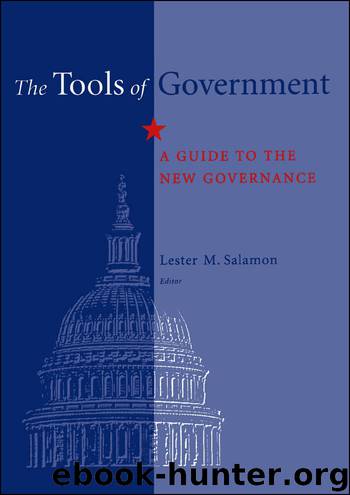Tools of Government by Salamon Lester M.;

Author:Salamon, Lester M.; [Salamon, Lester M.;]
Language: eng
Format: epub
ISBN: 0195136659
Publisher: Oxford University Press, Incorporated
Published: 2002-01-15T07:00:00+00:00
VI. OVERALL ASSESSMENT
As we have discussed, POS contracting has some unique challenges due to the complex human problems it seeks to address. When state and local governments decide to purchase services, they surrender a degree of control over the results. In addition, they cannot necessarily use the same procedures and obtain the same results as when purchasing other types of services, such as landscaping, refuse collection, or vehicle maintenance.
Contracting for human services has proved in many fields to be a flexible and effective method by which to deliver services through reputable agencies that have programmatic and service expertise. More recently, contracting has placed greater emphasis on measuring performance and evaluating outcomes, not merely as a way to reward good performance, but also to improve the quality of services. However, the presence of numerous intervening factors has made it difficult to show that this tool is more effective than direct government services.
To what extent the goal of improved efficiency is met through contracting for services is also unclear. Nonprofits and private firms offer uncertain efficiency advantages, since some cost reductions may be obtained through loosened personnel constraints, lower wage and benefit structures, and less-experienced employees.
Service contracting offers the possibility of increased equity and responsiveness in the distribution of services to clients. It may allow more opportunity to tailor services and programs to targeted client groups by agencies that have a better relationship with clients, in more convenient geographic locations. As a result, clients may have more successful outcomes. Additionally, having trusted agencies offer the service in a familiar setting may avoid some negative perceptions about unresponsive government bureaucracies.
Related to this, the contracting tool is viewed by many as having a high level of political legitimacy. It may engender greater support for certain programs for disadvantaged populations that have an otherwise weak base of support among elected officials by mobilizing public and nonprofit organizations in support of them.
At the same time, POS contracting has a number of drawbacks, as we have seen. The rationale for contracting rests heavily on the idea that “competition” for contracts encourages the design of better programs and services, and potentially greater emphasis on service evaluation and outcomes measurement. In reality, however, too few agencies are often available to deliver particular services, limiting government’s choices and potentially increasing political influence over renewals. In addition, contracting often encounters management problems and issues of the sort discussed in the previous section, such as intrusive monitoring and oversight; lack of service coordination; late reimbursement payments; multiple reporting requirements; communication difficulties; and lengthy and complicated procedures for proposals, awards, renewals, and negotiations.
Download
This site does not store any files on its server. We only index and link to content provided by other sites. Please contact the content providers to delete copyright contents if any and email us, we'll remove relevant links or contents immediately.
The Secret History by Donna Tartt(18159)
The Social Justice Warrior Handbook by Lisa De Pasquale(11951)
Thirteen Reasons Why by Jay Asher(8451)
This Is How You Lose Her by Junot Diaz(6435)
Weapons of Math Destruction by Cathy O'Neil(5829)
Zero to One by Peter Thiel(5488)
Beartown by Fredrik Backman(5356)
The Myth of the Strong Leader by Archie Brown(5237)
The Fire Next Time by James Baldwin(5016)
How Democracies Die by Steven Levitsky & Daniel Ziblatt(4954)
Promise Me, Dad by Joe Biden(4908)
Stone's Rules by Roger Stone(4857)
100 Deadly Skills by Clint Emerson(4690)
A Higher Loyalty: Truth, Lies, and Leadership by James Comey(4550)
Rise and Kill First by Ronen Bergman(4545)
Secrecy World by Jake Bernstein(4388)
The David Icke Guide to the Global Conspiracy (and how to end it) by David Icke(4380)
The Farm by Tom Rob Smith(4323)
The Doomsday Machine by Daniel Ellsberg(4245)
